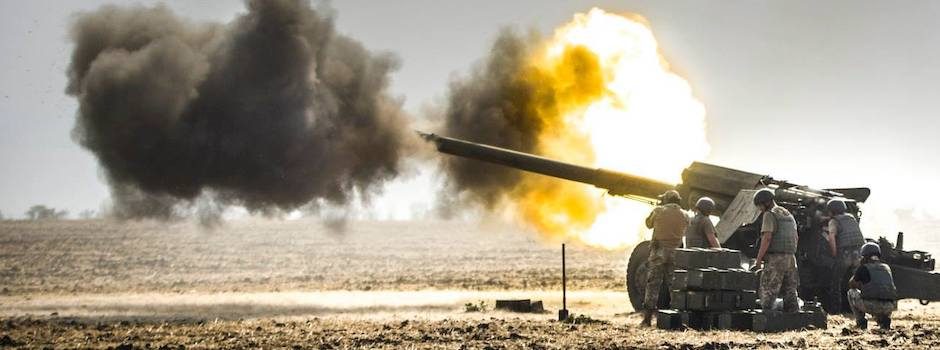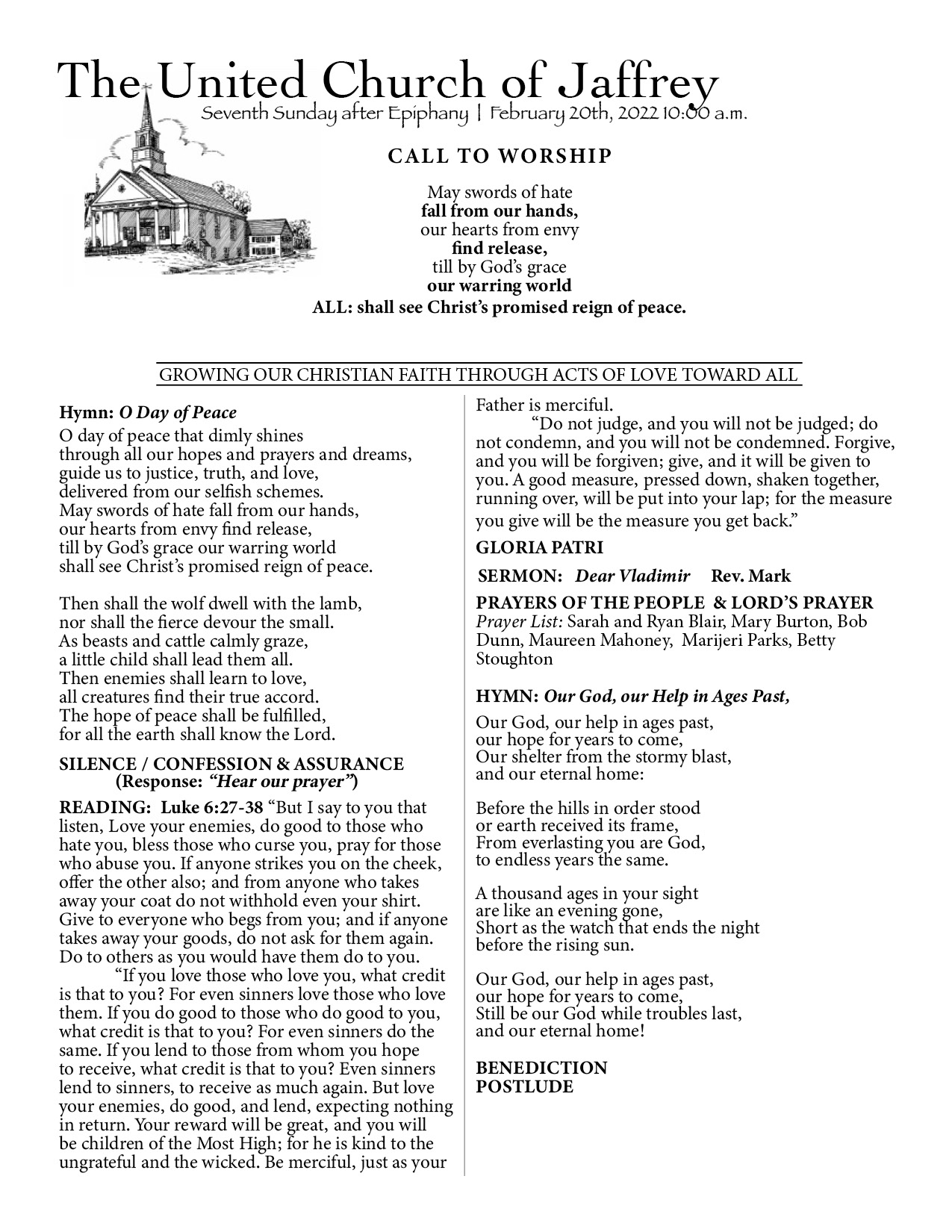Dear Vladimir:
I understand you are currently weighing your options, trying to decide whether or not to take military action and move into Ukraine.
For my part, right now, I am doing laundry.
You are in the halls of power, and I am in the hall that leads to my basement. And yet, we are both humans, are we not? You have ears. Perhaps you will hear the words of another man…
Irene Butter, the Holocaust survivor, once wrote: “Your Enemies are people who’s story you haven’t heard, or who’s face you haven’t seen.” So, as absurd as it may seem, I invite you, Vladimir, into my home as I do my laundry.
In fact, I should be writing a sermon, but with two teenage boys in the house, I find I can no longer ignore the growing mountain of laundry. Actually, this doing of laundry more than just doing laundry. This is what I call the “art of productive procrastination.” Sometimes the best way to think about something is to do something else entirely – something that is physical but doesn’t require your full attention. Engaged in such an activity, the mind can wander, and one can actually do the crucial thinking that must be done. Doing laundry allows me to write my sermon, as it were, without writing my sermon.
I imagine you must be familiar with this dynamic, Vladimir. Perhaps you don’t do your own laundry though. Perhaps you do your thinking while you ride around on horseback. I have seen the famous pictures of you riding around the countryside on horseback. You are relaxing. You love this. I can tell. We are both humans, you and I. So I can tell just by looking at you as you ride your horse, that this is a pleasure for you. No doubt you think, while you ride your horse.
You are a strategic thinker.
You are a strategic thinker. I am a religious thinker.
You are a strategic thinker, weighing whether or not to order 150 thousand troops to move into Ukraine. Perhaps you are trying to decide whether it might be better to soften up Kyiv a little bit with some bombing first. These are the kinds of things that concern someone orchestrating a military transfer of power.
I am a religious thinker who is doing his son’s laundry. I like to do pants in one load and shirts in another. These are the concerns of a religious man, transferring dirty clothes into a washing machine.
As I do my laundry, Vladimir, I am thinking about you because, in a sense, my great teacher, Jesus, has asked me to think about you today. Like many religious men – not all, but many – I call myself a follower of Jesus – the one who said:
Love your enemies…
During the last several weeks, with this the military build up on the borders of Ukraine, it seems like your country and our country are at odds again, in the same way that we used to be during the cold war.
Suddenly it seems like we are enemies again.
Your country and my country.
So when Jesus says, Love your enemies, at this moment in time, it seems like he is challenging me to love you.
And so, instead of writing a sermon, as I usually do on a saturday… I am writing a letter to you, because I realize that this idea “love your enemy” is another thing that you and I have in common.
This teaching leans on both of us. It challenges both of us.
Most people in the world have already given up on this teaching though. They think it is absurd, and so they don’t think it worth considering when they are making decisions in the real world.
And there is good reason for this tendency to just dismiss Christ’s teaching.
I myself – though I am accustomed to listening to Jesus – when I hear “love your enemies” I am tempted to think:
“Really Jesus?”
Do you expect the violated woman to love the man who raped her?
And what of the Jews? Are they supposed to love the soldiers who lead them to the gas chambers?
Is the innocent black man expected to love the lynch mob who tortures and kills him?
It is unreasonable, even abhorrent to think about love in these settings.
Perhaps Jesus had only a proximate understanding of the depths of human depravity. No doubt the Romans were capable of brutality, but there’s only so much that can be done with swords and spears. He could not have known about killing on an industrial scale, as was to happen during the holocaust. He didn’t didn’t know about the middle passage, or about Hiroshima. Could Jesus have imagined that we would stockpile weapons powerful enough to destroy human civilization in a few hours.
We are way better at being cruel and depraved than we were during antiquity.
We’ve perfected the art of being enemies.
If Jesus knew what we know today, would he have given the same teaching?
Knowing what we know today, can we affirm such a teaching?
I suspect that you are nodding in agreement with this line of reasoning, Vladimir.
This is the best way to dismiss Jesus. He didn’t really know what he was talking about. If he knew what we knew he wouldn’t be so naive.
And once this teaching is dismissed, it is a great deal easier to wield power.
Power loves enemies. I suppose you are aware of this, Vladimir. It is of great strategic value to have a good enemy… someone who you can blame things on.
People want to blame other people. It is very comforting to place the blame. To place the blame on someone else, is to be absolved of the responsibility oneself. This makes power easy and fun.
The most convenient person to blame, of course, is the person you don’t know.
As Irene Butter, the Holocaust survivor and author once wrote: “Enemies are people who’s story you haven’t heard, or who’s face you haven’t seen.”
It is easy to be suspicious of the “other.” This is the easiest thing in the world.
We set up our lives in fear of the other. We lock our doors, in fear of the other. We hide our money in safe places, in fear of the other. We spend the majority of our federal budget on the military, in fear of the other.
To trust the “other” is to leave oneself vulnerable. All the other person has to do is decide that you are inconvenient, and they can do as they please with you. Especially if you are trying to follow Jesus, and you are trying to “love” your enemy.
But there is an antidote to this suspicion, isn’t there? It is called trust.
It is easy to trust those who are close to us because we know those people who live within our circles of intimacy. This is natural.
Is it equally natural to suspect those we don’t know? Or is this distrust something that powerful people have used for their advantage?
You, Vladimir, can answer this question.
Is it really absurd to believe the words of Jesus of Nazareth? Is it truly the case that we cannot trust each other?
Or is this suspicion that we hold for each other a legacy that has been used, generation after generation, by people who want to hold onto power?
In this sense, Vladimir, Jesus‘s words “love your enemy” are the most subversive words ever spoken in human history.
The three words, “Love your enemy” if fully realized, would dismantle all of the world’s injustice. It would make your job, of holding onto power, impossible.
Those in power find it very helpful that almost everyone in the world has agreed to dismiss Christ’s words as naïve and unattainable in the real world. How can a person realize the ambitions of power if they are called upon to love their enemies?
As you contemplate whether or not to invade Ukraine, Vladimir, I ask you to remember your brother Viktor who died of diphtheria during the Siege of Leningrad.
We are all… even you… affected by the legacy of war.
War is what happens when The words of Jesus are ignored.
Millions of people have perished in war, and their children and brothers have been scared by that loss.
“Love thy enemy” is absurd.
But is it any more absurd than “Hate you enemies?”
“Hate your enemies” has given us the legacy of violence and war.
Love your enemy – the most subversive words ever spoken – give us the possibility – the possibility of another world. The possibility of healing. The possibility of community.
These three words, Vladimir, the words, “Love your enemy,” offer you an elegant and true way to resolve the problem that is weighing on you today.
I challenge you to think what that may mean for you
And for all of us.
Amen


